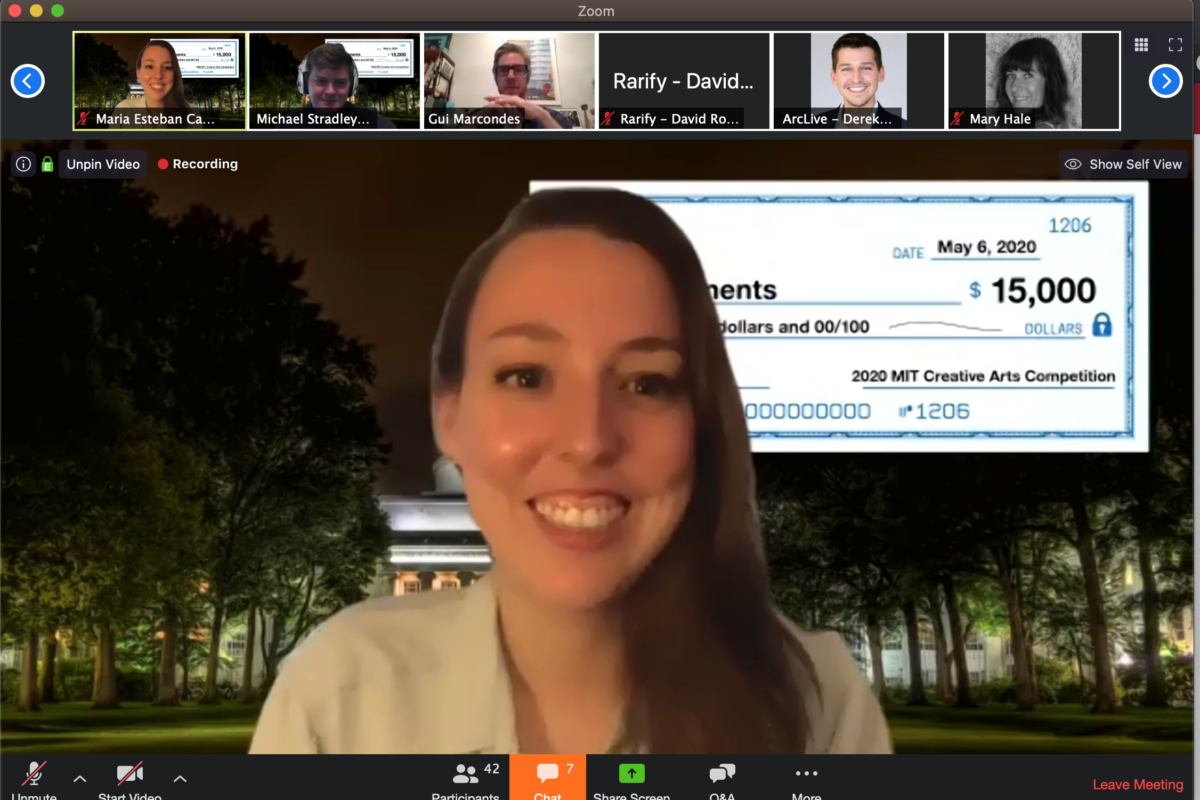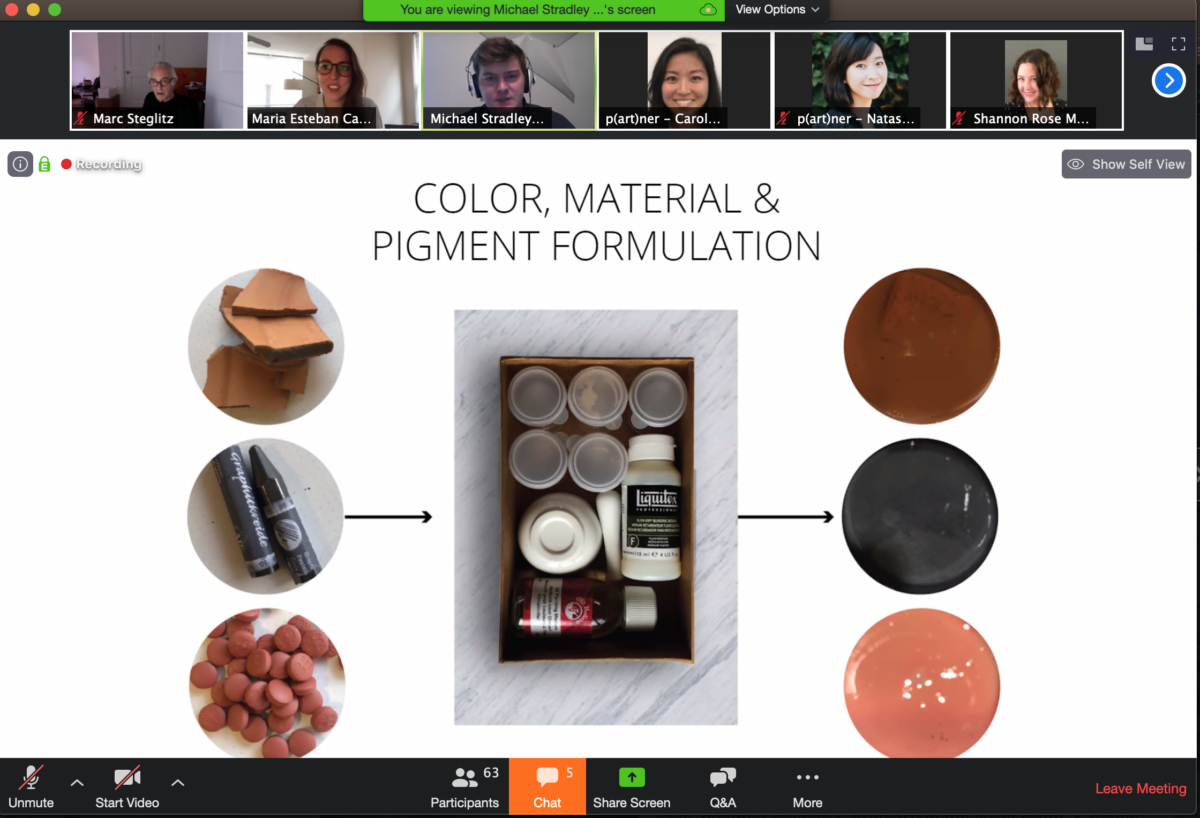Eight years ago, MIT launched a novel competition designed to foster arts-focused startups at the Institute. “There were a number of arts prizes awarded at semester’s or year’s end,” says Leila W. Kinney, Executive Director of Arts Initiatives at MIT. “But we realized that startup competitions were where the action is at MIT.”
The action was electric at Wednesday’s final round of the $15K Creative Arts Competition at MIT. Because of COVID19 restrictions, the six finalist teams made virtual presentations (Watch the recording) to a jury composed of CEOs, arts administrators, entrepreneurs, and designers. Team Elements, which produces individual art making kits to promote creative thinking, took the $15,000 first prize. Rarify, an online platform that uses big data to assess and market classic furniture pieces, won $2,500 with second place, while Material Futures Lab, which uses biology to produce environmentally friendly pigments, was awarded the $1,000 third prize.
Each one brought something different to the table.
“We were honestly stunned by the level of all the entries,” said first prize winner Michael Stradley, SMArchS ‘20, who along with Maria Esteban Casanas, SMArchS ‘20, created Elements. “All of the teams were super impressive, and each one brought something different to the table. It’s one of the beauties of this competition. MIT has a great ecosystem of innovation and entrepreneurship. We were fortunate to get our start with DesignX at the beginning of the year which helped us build our initial idea into a venture.”
The $15K Competition has attracted close to 200 student teams since 2013. Each year, groups of aspiring arts entrepreneurs submit proposals, attend workshops, and meet with mentors to hone their business plans and pitches. The projects span the ecosystem of creative projects; past winners include a virtual reality device for the blind and crowdfunding site to invest in music labels.
“At other schools, entrepreneurship and the arts usually means giving students management training,” says Kinney “For us, it means helping students acquire the capacity they need to launch viable ventures that have the arts at their core.”
This year’s competition drew a total of 17 entries. As in past years, each team met remotely with a mentor through Mentorly, an online platform that pairs students with professionals in an applicable field. Beginning in mid-March, due to COVID19, all competition workshops and events were moved online including last week’s final pitch critique session and the final presentations.
It’s Not Just About Winning
While the cash prizes can help winning teams pivot into the marketplace, the competition is intended to benefit all participants. “This competition isn’t an endgame,” says Shannon Rose McAuliffe, who took over as Manager of Student Art Programs at MIT last September. “It’s an infrastructure to support students who learn to face and overcome obstacles over time. Win or not, everyone who participates leaves with skills that will help them thrive in whatever field they choose.”
Past winners readily cite the acumen they gained from the Competition. “I learned to look at projects through two lenses—the human lens, and the financial lens,” says Marwan Aboudib SM’15, MArch ’15. Aboudib’s Tekuma team took first prize in 2015 with a project that brought artworks to Airbnb hosts, increasing their rental values while providing income for artists. Today, Aboudib and his Tekuma partners work at Tekuma Frenchman, a global urban design and placemaking firm with offices in Boston and Dubai. “Even today, when I’m trying to win projects to design cities, I use those same lessons. I tell an amazing human story. And then I back it up with numbers.”
In addition to acquiring new skills, participants learn to collaborate, comparing notes and strategies with teammates and with other teams. “Our idea has probably gone through 100 iterations since we first thought of it,” says Jeremy Carmine Bilotti, SMArchS ‘20. “And a big part of that process was talking with other teams and learning from their experiences during the competition.”
The Value of Mentorship
Throughout the competition process students receive guidance and feedback from mentors, much like they might in an art or architecture studio. “All the students here are intelligent and motivated,” says Hailey Fuqua, a Boston-based vocalist and arts entrepreneur who mentored two of this year’s entrants. “But there are basic parts of launching a brand you can’t know until you’ve done it.”
For Rebecca Hui, MCP’18, who reached the final round of the 2016 competition and won first prize in 2017, the competition mentors showed her a path forward. “It was inspiring to meet MIT alumni who started with an idea and were then able to launch it,” says Hui, founder and CEO of Roots Studio, a Brooklyn New York based company that digitizes artworks from traditional artists around the world and licenses them to high end fashion and retail. “By the time I left MIT, after two $15K Competitions, I had a much clearer idea of what I wanted to do and how I could work towards it.”
The learning flows both ways between students and mentors. “These students are incredibly flexible in their thinking,” says Aithan Shapira, an artist, consultant, and Lecturer at the MIT Sloan School of Management who mentored teams in 2019 and 2020. “They know there is more than one way to approach and solve a problem and are eager to find the best one. It’s an important reminder for all of us, especially in this climate where we’re talking about finding a new normal.”
While the $15K Creative Arts Competition is conceived to bring business acumen to the arts, it also brings artistic acumen to business. “Art is a way of thinking,” says Nir Hindi, founder of Artian, a Madrid based business consultancy. Hindi mentored the 2019 winning project “Teach to Learn,” an online global music mentorship program. “It’s a mindset that supports curiosity, imagination, and teaches us to deal with ambiguity. This type of competition shows that there are possibilities well beyond the boxes we try to fit ourselves into.”



